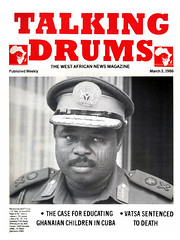Military action not sanctions: the key to apartheid
By Amusu Kwaggrey
Recent disturbances in South Africa have led to hundreds of people dying in street riots, while the intransigent Botha government flexes its muscles in the face of mounting international pressure. What's to be done?Apartheid as a doctrine and practice of racial segregation and subjugation in South Africa is a blot on Africa's escutcheon that must be crushed without any further delay. Because the more we delay the more we worsen the plight of our kinsmen in South Africa and Namibia who are now bearing the full brunt of apartheid supremacy and atrocities.
When the Commonwealth met in Nassau, Bahamas, for its 1985 annual summit conference, it agreed no more than an economic sanction and, to some extent, a dialogue as a solution to the apartheid case. Hence the formation of a so-called "contact group", stereo-typed on the model of the "Contact Groups" designed by the imperialists some years ago, as a complimentary instrument to end the apartheid system. But all this cannot bring about a complete destruction of apartheid.
Pan-African revolutionaries see no genuine solution to the South African apartheid question in a tutelage economic sanctions or dialogue, but in a military action based on an organised Continental military force or African High Com- mand. Anything less than this option will be a betrayal to the cause we stand for, that is, a total liberation, unification and advancement of Africa.
The apartheid system in South Africa is an extension of western capitalism and therefore cannot be destroyed through economic sanctions.
Sanction itself is a blunt tool. It did not work in Rhodesia and cannot work against South Africa. The on-going drive to impose an economic sanction against South Africa is another coverage designed by some world leaders to hoodwink Africans and perpetuate the apartheid system. The solution is far from this line of option or approach. The answer lies in all-African military and revolutionary action against the system and its collaborators.
We are living in a world where nations and governments say one thing and do another. And when such a sanction comes to be imposed at all, those who will claim to be its architects and monitors will be the first to violate its spirit and betray its purpose. For instance, the UN arms embargo in 1977 and OPEC's oil embargo in 1980 were all flouted by the multi- nationals and the West.
The movement for exclusion of South Africa, as a method of dismantling apartheid, has been going on for over two decades now but has not attained its objective. In 1961 under the pressure from member states, South Africa withdrew from the Commonwealth. In 1963 the Economic and Social Council suspended South Africa from membership of the UN Economic Commission for Africa. In 1964 South Africa withdrew from the International Labour Organisation and later walked out of the World Health Organisation annual assembly.
South Africa has also been expelled or suspended or withdrawn from UNESCO, the Commission for Technical Co- operation in Africa, the Scientific Council for Africa, the International Civil Aviation Organisation, the International Telecommunications Union, the Food & Agriculture Organisation, the Congress of the Universal Postal Union and Olympic Games.
In 1979, the UN General Assembly launched a programme of International mobilisation against apartheid, and denounced the establishment of "Bantu- stans" a device manufactured to as consolidate apartheid and white minority domination in South Africa. It appealed to the world community not to recognise the so-called independence of Transkei, Bophuthatswana and Venda.
The Assembly also asked the Security Council to urgently consider mandatory economic sanctions against racist South Africa by stopping:
1) Military or nuclear collaboration with South Africa;
2) Supplies of petroleum, petroleum products and other strategic materials to South Africa;
3) Loans to and investment in South Africa;
4) Guarantees or other inducements for investment in South Africa; and
5) All trade with South Africa.
Despite this orchestration of world opinion and clamour against South Africa coupled with internal resistance, the racist regime has refused stubbornly to yield.
Despite this orchestration of world opinion and clamour against South Africa coupled with internal resistance, the racist regime has refused stubbornly to yield because of the support and security it enjoys from the capitalist nations of the world who have throughout played and continue to play a two-faced role in solidarity with the apartheid. It was out of this tacit support that Botha recently announced that apartheid would continue for the next 300 years. Why 300 years but not forever? Ian Smith said a similar thing before, but where is he now?
When in 1946 at the first session of the UN, India raised the issue of South Africa's racial policies, the Western powers brushed it aside as a matter of domestic jurisdiction and outside the competence of the UN. It was not until 1957 before the UN took the matter up and even then the Western countries used their veto power to obstruct any move directed against South Africa.
In 1975 a tripartite American-British-French veto was used to save South Africa's expulsion from the UN. Since then the US and the West European nations have always frustrated effective international action against the racist government in South Africa. In recent years they have intensified varied collective action calculated to divert attention from the crucial role they are playing to sustain the racist regime so as to maintain their economic, strategic and cultural links with Pretoria. Reagan's policy of "constructive engagement" with South Africa tells them all.
The West's economic interests and in- vestments in South Africa are mammoth and they will never willingly sacrifice them in the interest of African freedom unless force is applied through a united action of African people.
